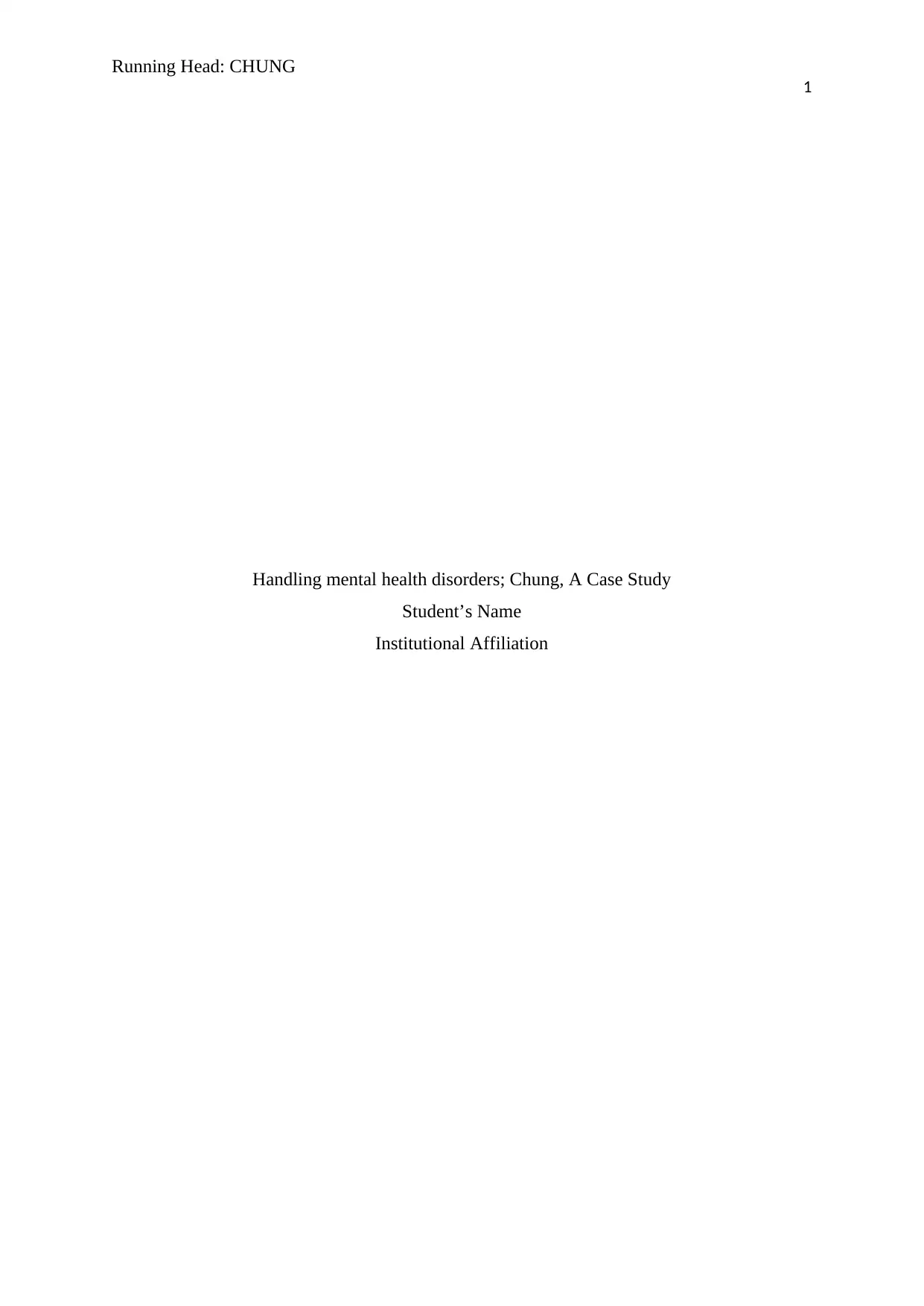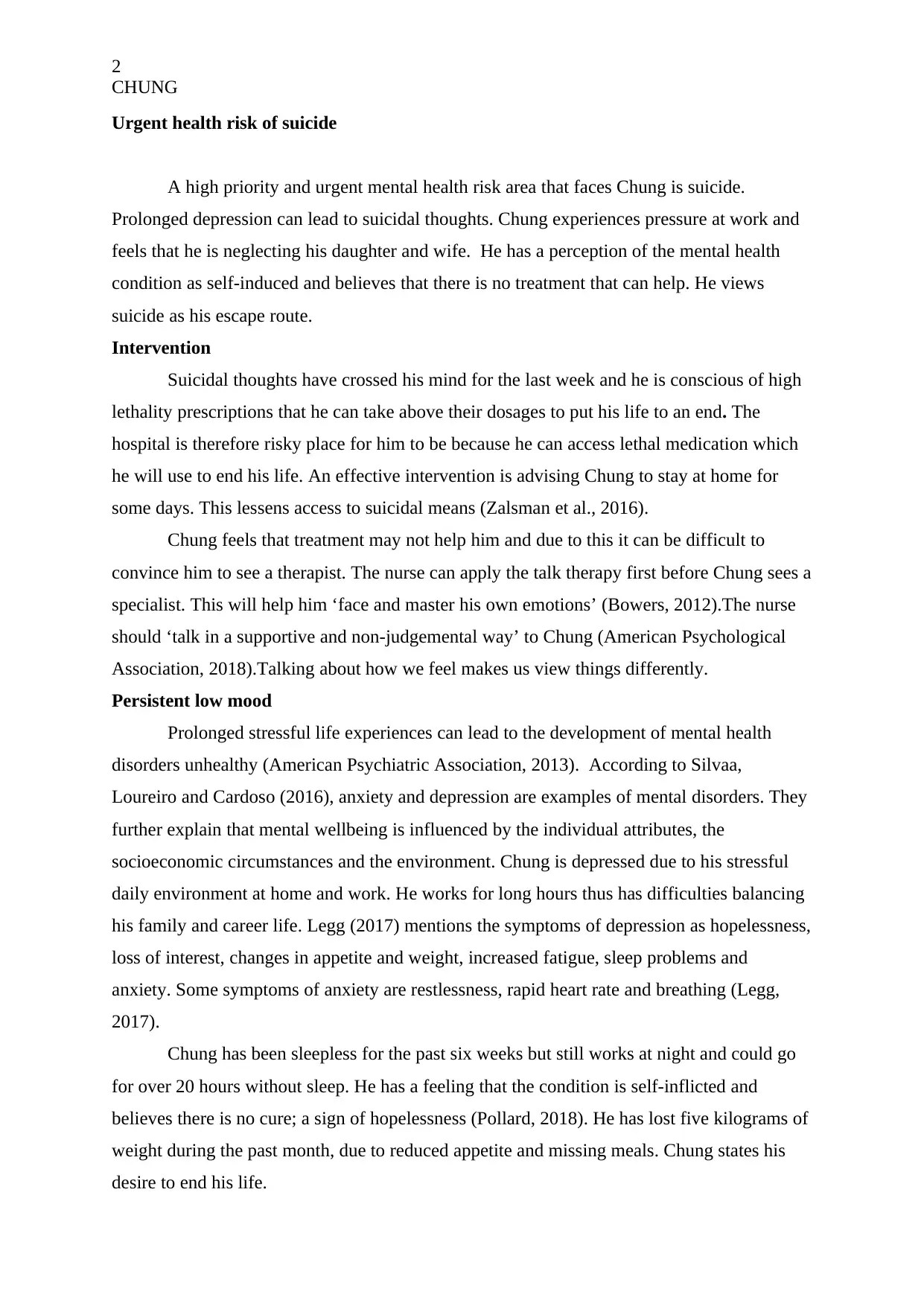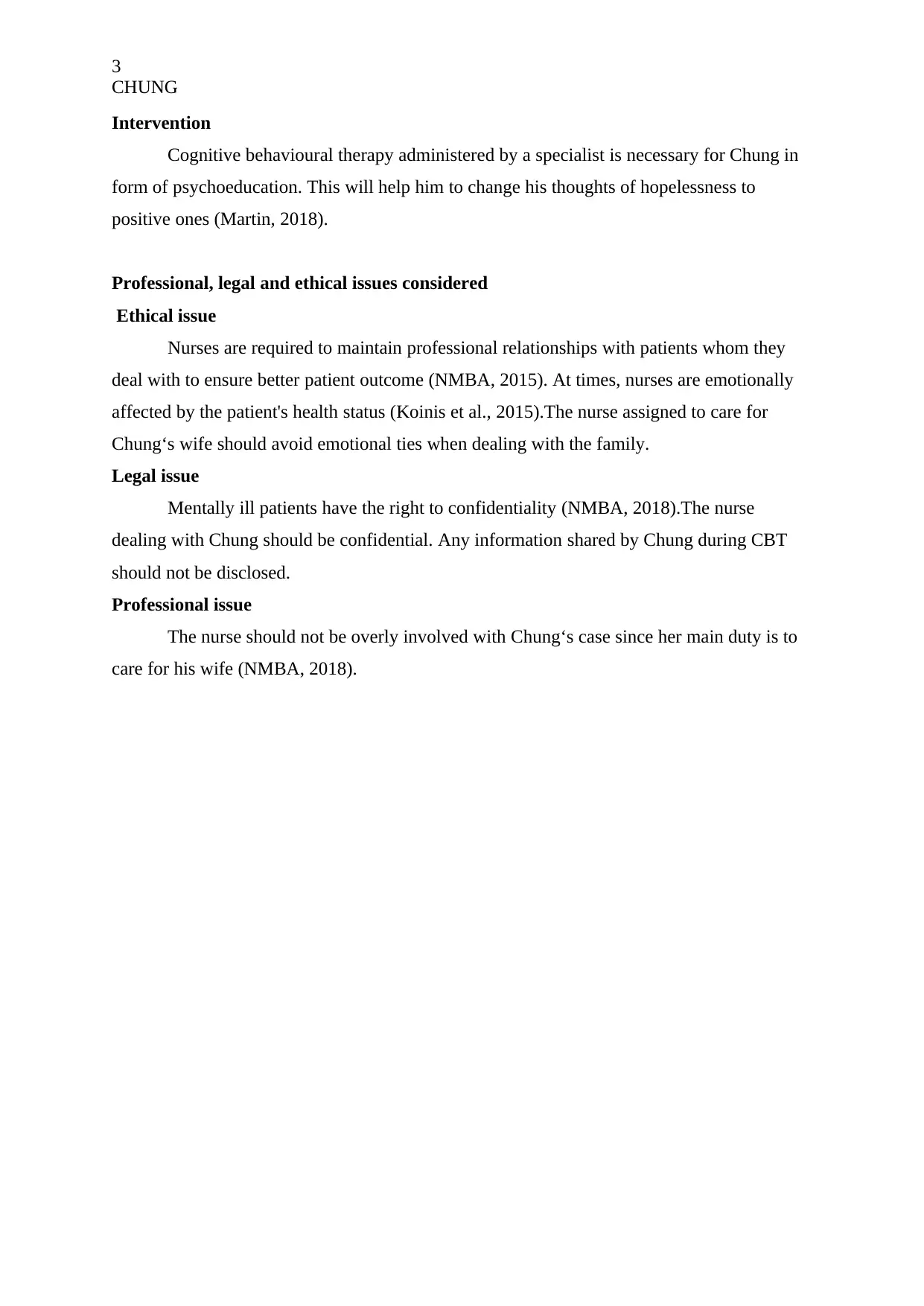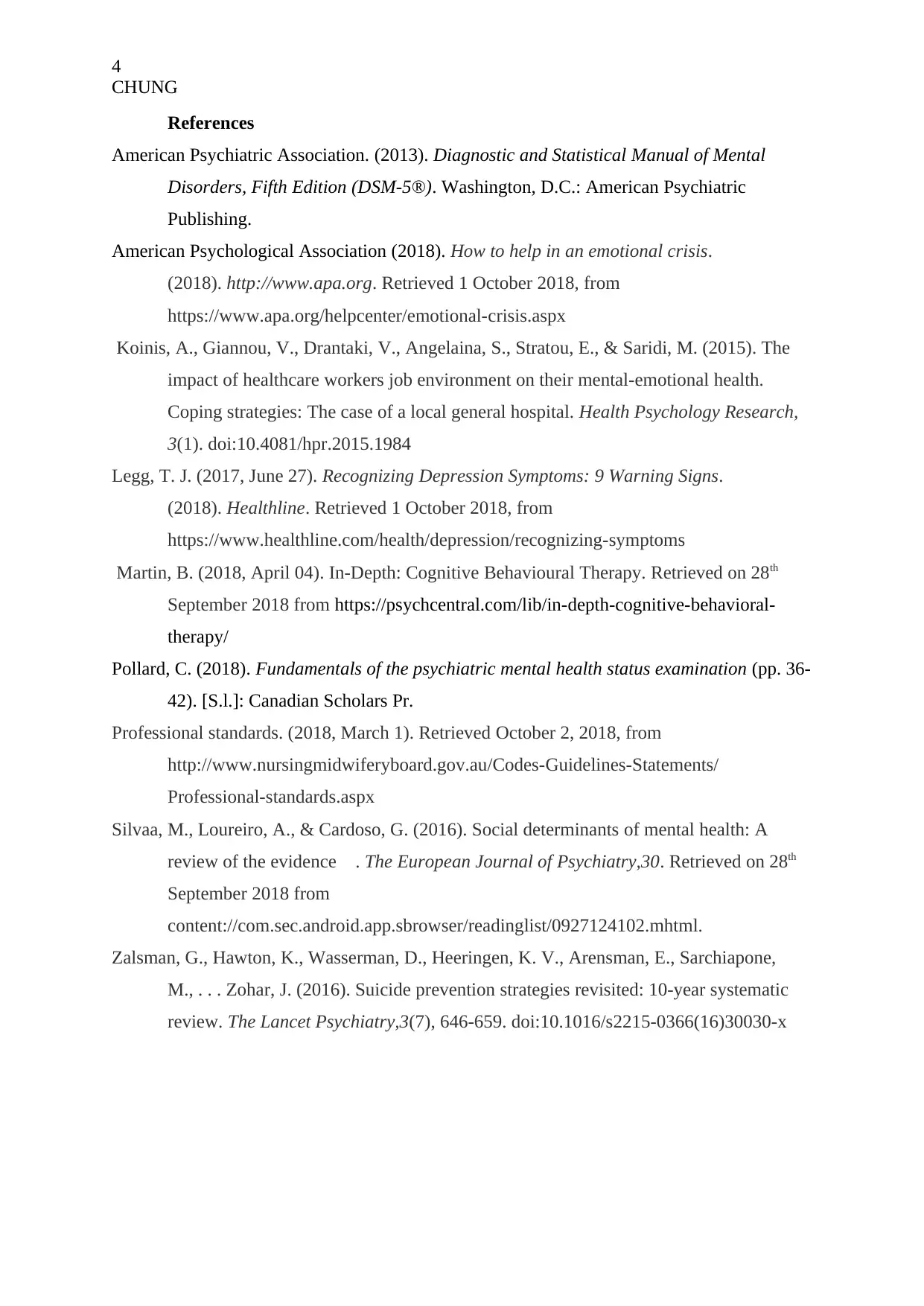Case Study: Managing Mental Health, Suicide Risk in Chung, Australia
VerifiedAdded on 2023/06/03
|5
|1011
|415
Case Study
AI Summary
This case study focuses on Chung, a 35-year-old male doctor in Australia facing mental health challenges, including depression and suicide ideation, stemming from work stress, family pressures, and a past drug error incident. The analysis identifies suicide as a high-priority risk, emphasizing the need for interventions such as limiting access to lethal medications and initiating talk therapy. Cognitive behavioral therapy (CBT) is recommended to address Chung's feelings of hopelessness and promote positive thinking. The case study also highlights ethical, legal, and professional considerations for nurses involved in Chung's care, including maintaining confidentiality and professional boundaries. The provided references support the recommended interventions and ethical guidelines for healthcare professionals.

Running Head: CHUNG
1
Handling mental health disorders; Chung, A Case Study
Student’s Name
Institutional Affiliation
1
Handling mental health disorders; Chung, A Case Study
Student’s Name
Institutional Affiliation
Paraphrase This Document
Need a fresh take? Get an instant paraphrase of this document with our AI Paraphraser

2
CHUNG
Urgent health risk of suicide
A high priority and urgent mental health risk area that faces Chung is suicide.
Prolonged depression can lead to suicidal thoughts. Chung experiences pressure at work and
feels that he is neglecting his daughter and wife. He has a perception of the mental health
condition as self-induced and believes that there is no treatment that can help. He views
suicide as his escape route.
Intervention
Suicidal thoughts have crossed his mind for the last week and he is conscious of high
lethality prescriptions that he can take above their dosages to put his life to an end. The
hospital is therefore risky place for him to be because he can access lethal medication which
he will use to end his life. An effective intervention is advising Chung to stay at home for
some days. This lessens access to suicidal means (Zalsman et al., 2016).
Chung feels that treatment may not help him and due to this it can be difficult to
convince him to see a therapist. The nurse can apply the talk therapy first before Chung sees a
specialist. This will help him ‘face and master his own emotions’ (Bowers, 2012).The nurse
should ‘talk in a supportive and non-judgemental way’ to Chung (American Psychological
Association, 2018).Talking about how we feel makes us view things differently.
Persistent low mood
Prolonged stressful life experiences can lead to the development of mental health
disorders unhealthy (American Psychiatric Association, 2013). According to Silvaa,
Loureiro and Cardoso (2016), anxiety and depression are examples of mental disorders. They
further explain that mental wellbeing is influenced by the individual attributes, the
socioeconomic circumstances and the environment. Chung is depressed due to his stressful
daily environment at home and work. He works for long hours thus has difficulties balancing
his family and career life. Legg (2017) mentions the symptoms of depression as hopelessness,
loss of interest, changes in appetite and weight, increased fatigue, sleep problems and
anxiety. Some symptoms of anxiety are restlessness, rapid heart rate and breathing (Legg,
2017).
Chung has been sleepless for the past six weeks but still works at night and could go
for over 20 hours without sleep. He has a feeling that the condition is self-inflicted and
believes there is no cure; a sign of hopelessness (Pollard, 2018). He has lost five kilograms of
weight during the past month, due to reduced appetite and missing meals. Chung states his
desire to end his life.
CHUNG
Urgent health risk of suicide
A high priority and urgent mental health risk area that faces Chung is suicide.
Prolonged depression can lead to suicidal thoughts. Chung experiences pressure at work and
feels that he is neglecting his daughter and wife. He has a perception of the mental health
condition as self-induced and believes that there is no treatment that can help. He views
suicide as his escape route.
Intervention
Suicidal thoughts have crossed his mind for the last week and he is conscious of high
lethality prescriptions that he can take above their dosages to put his life to an end. The
hospital is therefore risky place for him to be because he can access lethal medication which
he will use to end his life. An effective intervention is advising Chung to stay at home for
some days. This lessens access to suicidal means (Zalsman et al., 2016).
Chung feels that treatment may not help him and due to this it can be difficult to
convince him to see a therapist. The nurse can apply the talk therapy first before Chung sees a
specialist. This will help him ‘face and master his own emotions’ (Bowers, 2012).The nurse
should ‘talk in a supportive and non-judgemental way’ to Chung (American Psychological
Association, 2018).Talking about how we feel makes us view things differently.
Persistent low mood
Prolonged stressful life experiences can lead to the development of mental health
disorders unhealthy (American Psychiatric Association, 2013). According to Silvaa,
Loureiro and Cardoso (2016), anxiety and depression are examples of mental disorders. They
further explain that mental wellbeing is influenced by the individual attributes, the
socioeconomic circumstances and the environment. Chung is depressed due to his stressful
daily environment at home and work. He works for long hours thus has difficulties balancing
his family and career life. Legg (2017) mentions the symptoms of depression as hopelessness,
loss of interest, changes in appetite and weight, increased fatigue, sleep problems and
anxiety. Some symptoms of anxiety are restlessness, rapid heart rate and breathing (Legg,
2017).
Chung has been sleepless for the past six weeks but still works at night and could go
for over 20 hours without sleep. He has a feeling that the condition is self-inflicted and
believes there is no cure; a sign of hopelessness (Pollard, 2018). He has lost five kilograms of
weight during the past month, due to reduced appetite and missing meals. Chung states his
desire to end his life.

3
CHUNG
Intervention
Cognitive behavioural therapy administered by a specialist is necessary for Chung in
form of psychoeducation. This will help him to change his thoughts of hopelessness to
positive ones (Martin, 2018).
Professional, legal and ethical issues considered
Ethical issue
Nurses are required to maintain professional relationships with patients whom they
deal with to ensure better patient outcome (NMBA, 2015). At times, nurses are emotionally
affected by the patient's health status (Koinis et al., 2015).The nurse assigned to care for
Chung‘s wife should avoid emotional ties when dealing with the family.
Legal issue
Mentally ill patients have the right to confidentiality (NMBA, 2018).The nurse
dealing with Chung should be confidential. Any information shared by Chung during CBT
should not be disclosed.
Professional issue
The nurse should not be overly involved with Chung‘s case since her main duty is to
care for his wife (NMBA, 2018).
CHUNG
Intervention
Cognitive behavioural therapy administered by a specialist is necessary for Chung in
form of psychoeducation. This will help him to change his thoughts of hopelessness to
positive ones (Martin, 2018).
Professional, legal and ethical issues considered
Ethical issue
Nurses are required to maintain professional relationships with patients whom they
deal with to ensure better patient outcome (NMBA, 2015). At times, nurses are emotionally
affected by the patient's health status (Koinis et al., 2015).The nurse assigned to care for
Chung‘s wife should avoid emotional ties when dealing with the family.
Legal issue
Mentally ill patients have the right to confidentiality (NMBA, 2018).The nurse
dealing with Chung should be confidential. Any information shared by Chung during CBT
should not be disclosed.
Professional issue
The nurse should not be overly involved with Chung‘s case since her main duty is to
care for his wife (NMBA, 2018).
⊘ This is a preview!⊘
Do you want full access?
Subscribe today to unlock all pages.

Trusted by 1+ million students worldwide

4
CHUNG
References
American Psychiatric Association. (2013). Diagnostic and Statistical Manual of Mental
Disorders, Fifth Edition (DSM-5®). Washington, D.C.: American Psychiatric
Publishing.
American Psychological Association (2018). How to help in an emotional crisis.
(2018). http://www.apa.org. Retrieved 1 October 2018, from
https://www.apa.org/helpcenter/emotional-crisis.aspx
Koinis, A., Giannou, V., Drantaki, V., Angelaina, S., Stratou, E., & Saridi, M. (2015). The
impact of healthcare workers job environment on their mental-emotional health.
Coping strategies: The case of a local general hospital. Health Psychology Research,
3(1). doi:10.4081/hpr.2015.1984
Legg, T. J. (2017, June 27). Recognizing Depression Symptoms: 9 Warning Signs.
(2018). Healthline. Retrieved 1 October 2018, from
https://www.healthline.com/health/depression/recognizing-symptoms
Martin, B. (2018, April 04). In-Depth: Cognitive Behavioural Therapy. Retrieved on 28th
September 2018 from https://psychcentral.com/lib/in-depth-cognitive-behavioral-
therapy/
Pollard, C. (2018). Fundamentals of the psychiatric mental health status examination (pp. 36-
42). [S.l.]: Canadian Scholars Pr.
Professional standards. (2018, March 1). Retrieved October 2, 2018, from
http://www.nursingmidwiferyboard.gov.au/Codes-Guidelines-Statements/
Professional-standards.aspx
Silvaa, M., Loureiro, A., & Cardoso, G. (2016). Social determinants of mental health: A
review of the evidence . The European Journal of Psychiatry,30. Retrieved on 28th
September 2018 from
content://com.sec.android.app.sbrowser/readinglist/0927124102.mhtml.
Zalsman, G., Hawton, K., Wasserman, D., Heeringen, K. V., Arensman, E., Sarchiapone,
M., . . . Zohar, J. (2016). Suicide prevention strategies revisited: 10-year systematic
review. The Lancet Psychiatry,3(7), 646-659. doi:10.1016/s2215-0366(16)30030-x
CHUNG
References
American Psychiatric Association. (2013). Diagnostic and Statistical Manual of Mental
Disorders, Fifth Edition (DSM-5®). Washington, D.C.: American Psychiatric
Publishing.
American Psychological Association (2018). How to help in an emotional crisis.
(2018). http://www.apa.org. Retrieved 1 October 2018, from
https://www.apa.org/helpcenter/emotional-crisis.aspx
Koinis, A., Giannou, V., Drantaki, V., Angelaina, S., Stratou, E., & Saridi, M. (2015). The
impact of healthcare workers job environment on their mental-emotional health.
Coping strategies: The case of a local general hospital. Health Psychology Research,
3(1). doi:10.4081/hpr.2015.1984
Legg, T. J. (2017, June 27). Recognizing Depression Symptoms: 9 Warning Signs.
(2018). Healthline. Retrieved 1 October 2018, from
https://www.healthline.com/health/depression/recognizing-symptoms
Martin, B. (2018, April 04). In-Depth: Cognitive Behavioural Therapy. Retrieved on 28th
September 2018 from https://psychcentral.com/lib/in-depth-cognitive-behavioral-
therapy/
Pollard, C. (2018). Fundamentals of the psychiatric mental health status examination (pp. 36-
42). [S.l.]: Canadian Scholars Pr.
Professional standards. (2018, March 1). Retrieved October 2, 2018, from
http://www.nursingmidwiferyboard.gov.au/Codes-Guidelines-Statements/
Professional-standards.aspx
Silvaa, M., Loureiro, A., & Cardoso, G. (2016). Social determinants of mental health: A
review of the evidence . The European Journal of Psychiatry,30. Retrieved on 28th
September 2018 from
content://com.sec.android.app.sbrowser/readinglist/0927124102.mhtml.
Zalsman, G., Hawton, K., Wasserman, D., Heeringen, K. V., Arensman, E., Sarchiapone,
M., . . . Zohar, J. (2016). Suicide prevention strategies revisited: 10-year systematic
review. The Lancet Psychiatry,3(7), 646-659. doi:10.1016/s2215-0366(16)30030-x
Paraphrase This Document
Need a fresh take? Get an instant paraphrase of this document with our AI Paraphraser

5
CHUNG
CHUNG
1 out of 5
Related Documents
Your All-in-One AI-Powered Toolkit for Academic Success.
+13062052269
info@desklib.com
Available 24*7 on WhatsApp / Email
![[object Object]](/_next/static/media/star-bottom.7253800d.svg)
Unlock your academic potential
Copyright © 2020–2026 A2Z Services. All Rights Reserved. Developed and managed by ZUCOL.



